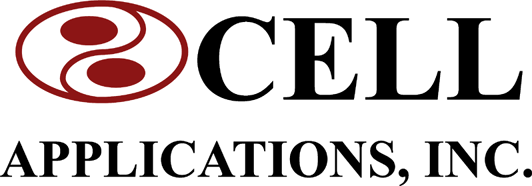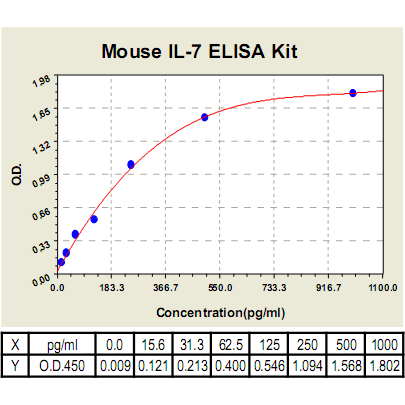Product Sheet CL0780
Description
BACKGROUND Interleukin 7 (IL-7) is a 25-kDa cytokine produced by stromal cells. It promotes growth of B-cell precursors, and is essential for the development and survival of T lymphocytes. Moreover, IL-7 is an important regulator of T-cell homeostasis. IL-7 potently modulates T-cell immune reconstitution through the combined effects of increasing thymic output and enhancing homeostatic peripheral T cell expansion. Furthermore, IL-7 also influences the development and function of dendritic cell populations and mobilizes myeloid populations. IL-7 is classified as a type 1 short-chain cytokine of the hematopoietin family, a group that also includes IL-2, IL-3, IL-4, IL-5, granulocyte macrophage-colony-stimulating factor (GM-CSF), IL-9, IL-13, IL-15, M-CSF, and stem cell factor (SCF).1 IL-7 signals through IL-7 receptors which consist of a common cytokine gamma chain ( c) and a IL-7 receptor alpha chain (IL-7R ) (CD127). Signaling through the IL-7R requires both IL-7R and the c component. Because c is expressed ubiquitously on lymphoid cells, the identification of IL-7R implies that IL-7 binding and subsequent signaling could occur. In general, IL-7R can be identified on immature B cells through the early pre-B stage, on thymocytes, and on most mature T cells with transient down-regulation upon activation. IL-7 signaling involves a number of nonreceptor tyrosine kinase pathways that associate with the cytoplasmic tail of the receptor. Binding of IL-7 to the IL-7R chain and c leads to heterodimerization of these components and to juxtaposition of the intracellular signaling molecules Jak 3 and Jak 1. Phosphorylation of tyrosine residues within the cytoplasmic domain of the IL-7R chain and the Jak 1 molecule results in the activation of multiple downstream signaling pathways, including STAT5a and STAT5b, PI3-kinase (PI3K), and src kinases. In addition IL-7 signaling alters bcl-2 family member expression and localization, resulting in cell survival signals.2
The myriad effects of IL-7 on mature T cells and the down-regulation of TGF- induced by IL-7 make IL-7 an attractive molecule for inducing local tumor immunity. In addition to the expansion and maintenance of T cells expressing TCRs with high affinity for tumor antigens, IL-7 may also recruit low-affinity T cells clones, potentially broadening the immune response. This may have important implications for the control of tumor variants that lose expression of particular antigens. Enhanced generation of mature monocyte-derived dendritic cells by IL-7 combined with other factors, such as GM-CSF, is another mechanism through which IL-7 may enhance an antitumor immune response. Furthermore, IL-7, along with other cytokines, may contribute to the induction of a type 1 immune response and LAK cells. Finally, by diminishing TGF- production, IL-7 can potentially down-regulate one mechanism through which tumors suppress local immune responses.3
The myriad effects of IL-7 on mature T cells and the down-regulation of TGF- induced by IL-7 make IL-7 an attractive molecule for inducing local tumor immunity. In addition to the expansion and maintenance of T cells expressing TCRs with high affinity for tumor antigens, IL-7 may also recruit low-affinity T cells clones, potentially broadening the immune response. This may have important implications for the control of tumor variants that lose expression of particular antigens. Enhanced generation of mature monocyte-derived dendritic cells by IL-7 combined with other factors, such as GM-CSF, is another mechanism through which IL-7 may enhance an antitumor immune response. Furthermore, IL-7, along with other cytokines, may contribute to the induction of a type 1 immune response and LAK cells. Finally, by diminishing TGF- production, IL-7 can potentially down-regulate one mechanism through which tumors suppress local immune responses.3
REFERENCES
1. Fry, T.J. & Mackall, C.L.: Blood 99:3892-904, 2002
2. Fry, T.J. & Mackall, C.L.: Trends in Immunol. 22:564-71, 2001
3. Mazzucchelli, R. & Durum, S.K.: Nature Rev. Immunol. 7:144-54, 2007
2. Fry, T.J. & Mackall, C.L.: Trends in Immunol. 22:564-71, 2001
3. Mazzucchelli, R. & Durum, S.K.: Nature Rev. Immunol. 7:144-54, 2007
Products are for research use only. They are not intended for human, animal, or diagnostic applications.
Details
Cat.No.: | CL0780 |
Target Protein Species: | Mouse |
Range: | 15.6pg/ml-1000pg/ml |
Specificity: | No detectable cross-reactivity with any other cytokine. |
Storage: | Store at 4°C. Use within 6 months. |
ELISA Kits are based on standard sandwich enzyme-linked immunosorbent assay technology. Freshly prepared standards, samples, and solutions are recommended for best results.
Products
| Product | Size | CAT.# | Price | Quantity |
|---|---|---|---|---|
| Mouse IL-7 ELISA Kit: Mouse Interleukin-7 ELISA Kit | Size: 96 Wells | CAT.#: CL0780 | Price: $511.00 |

